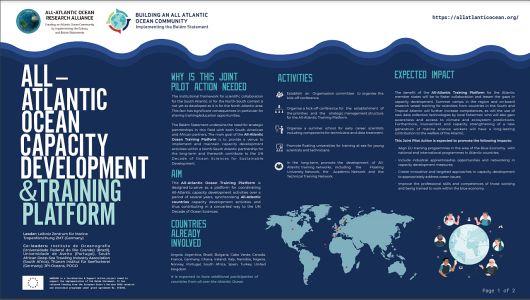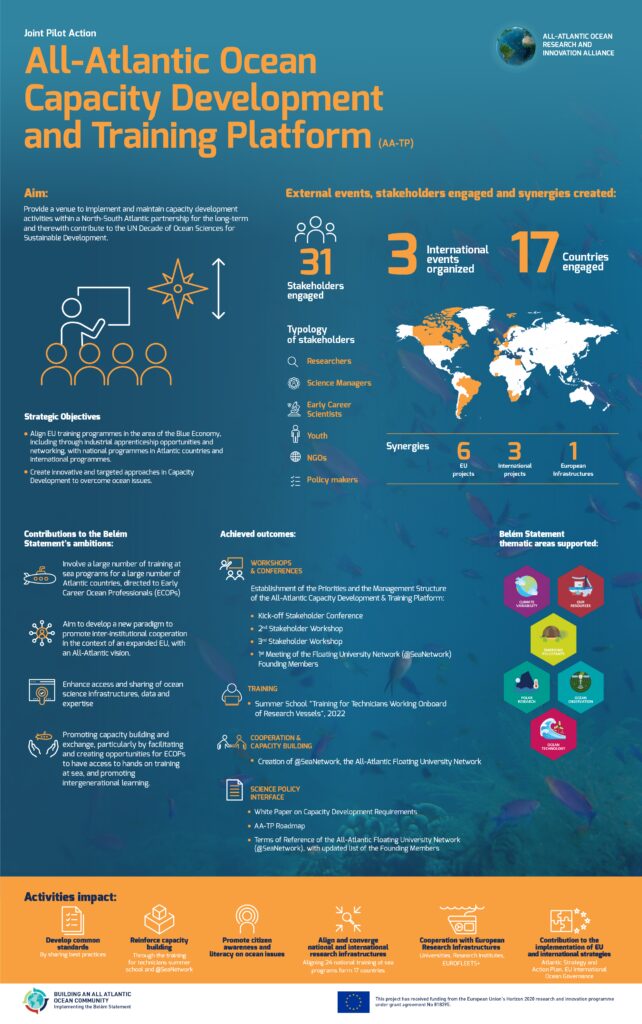All-Atlantic Ocean Capacity Development and Training Platform
The Joint Pilot Action on Capacity Development (AA-TP) plans to establish the “All- Atlantic Training Platform” AATP as a tool to identify training needs, gaps, initiatives and create workshops, summer schools, and floating universities for the benefit of early-career scientists and technicians in Ocean Science. Streamline and bring together existing training measures, new challenges and find new and attractive formats to include all stakeholders is essential to provide the best possible education for young talents.
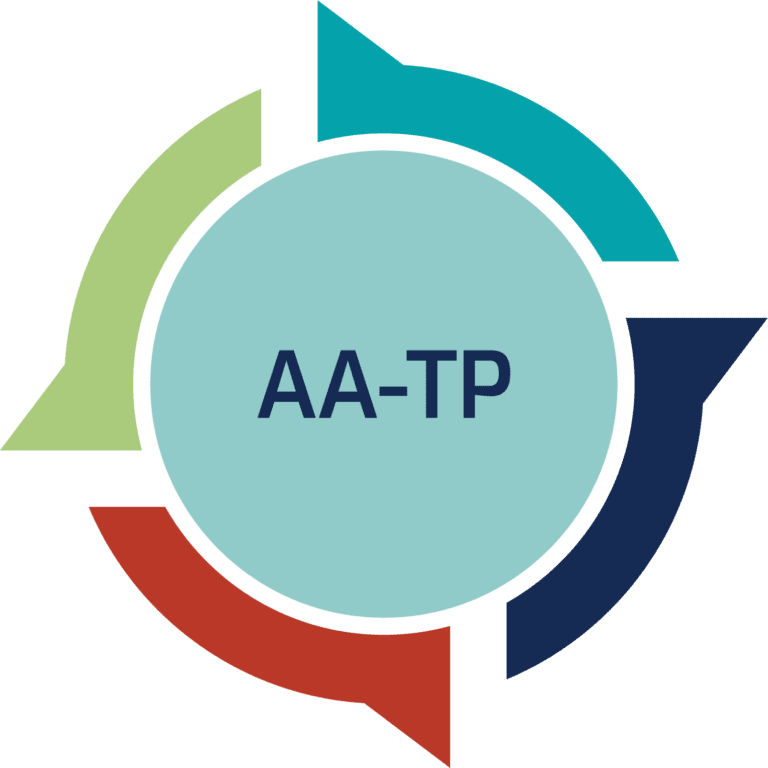
Aim
Institutionalized scientific collaboration as known for the North Atlantic does not exist for the South Atlantic or in a North-South context, with significant consequences in particular for sharing training/education opportunities. The Belém Statement (BS) underpins the need for strategic partnerships in this field with both South American and African partners. The main goal of the AATP is to provide a venue to implement and maintain capacity development activities within a North-South Atlantic partnership for the long-term and therewith contribute to the UN Decade of Ocean Sciences for Sustainable Development.
Activities and Outcomes
To achieve the goals established for this Joint Action, several activities are planned to be realized:
Establish an Organization committee to organize the kick-off conference
Organize kick-off conference for the establishment of the priorities and the strategic management structure for the AATP
Organize a summer school for early-career scientists including components for technicians and data treatment
Promote floating universities for training at sea for young scientists and technicians
In the long-term, promote the development of All-Atlantic training networks, including the Floating University Network, the Academic Network and the Technical Training Network
Impacts
The establishment of the AATP creates synergies through a confluence of different competencies and excellence at national levels across the Atlantic that would be shared to overcome national and regional fragmentation in capacity development activities and thereby contribute to the achievement of the All-Atlantic Ocean Research Alliance goals. Through the All-Atlantic training networks that will be created, including the Floating University Network, the Academic Network, and the Technical Training Network, synergies will be created with all interested initiatives interested in capacity development activities, including the All-Atlantic Ocean Research Alliance related projects. The expected impacts are:
Align EU training programmes in the area of the Blue Economy with national and international programmes in Atlantic countries
Include industrial apprenticeship opportunities and networking in capacity development measures
Create innovative and targeted approaches in capacity development to appropriately address ocean issues
Improve the professional skills and competencies of those working and being trained to work within the blue economy
The AATP will disseminate international ocean research best practices around the Atlantic, which will enhance international collaboration, improve the global network of ocean observations, and data sharing, inspired by a geographical balance of benefits. Most of all, the AATP will help to produce an integrated generation of young and new managers, scientists, and technicians. In turn, this will help, in the spirit of the All-Atlantic Ocean Research Alliance, to tackle the scientific and societal challenges of the Atlantic Ocean based on the principles of shared responsibility and mutual benefit in key common areas of interest such as: Climate Variability, Ocean Observation, Ocean Resources, Ocean Technology, Emerging Pollutant, Polar Research.

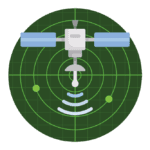
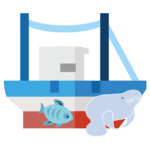
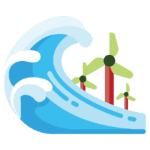
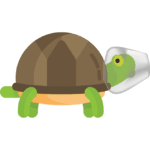
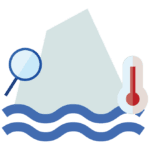
Outcomes
Short-term achieved outcomes (from January 2021 to January 2023):
- Got the community together for the establishment of the Priorities and the Management Structure of the All-Atlantic Capacity Development & Training Platform: (1) Kick-off Stakeholder Conference (June 2021); (2) 2nd Stakeholder Workshop (February 2022); (3) 3rd Stakeholder Workshop (May 2022). See report here.
- Defined a white paper and roadmap for the development and implementation of the AA-TP. See white paper here.
- Created an All-Atlantic Floating Unviersity Network (@SeaNetwork) with 27 founding members, approved Terms of Reference and Steering committee elected. See report here, and Terms of Reference here.
- Implemented a hands-on technical training on board of FRS Algoa contributing to technical skills of Atlantic professionals. See report here.
- Alignment of existing capacity development activities, including synergies with 6 All-Atlantic sister projects, 3 international projects, 1 European infrastructure and 34 initiatives (organisations, universities and research centers among others).
Long-term expected outputs:
- Implementation of the All-Atlantic Ocean Capacity Development and Training Platform provides opportunities for scientific and technological cooperation, as well as exchange of scientific and technical knowledge.
- Align Atlantic training programmes fostering collaboration and lessening the gaps in capacity development, promoting the increase of well-trained forces in ocean-related matters and preventing the loss of technical expertise developed during prior joint programmes or projects.
- Provide innovative capacity development tools related to key scientific questions investigated under All-Atlantic Ocean Research Alliance related projects.
- Prevent the loss of technical expertise developed during prior joint programmes or projects.
- Provide access to training on user-friendly, low-cost instrumentation in coastal ocean observing in line with the OpenMODS Programme in the Partnership for Observation of the Global Ocean (POGO).
Partners Involved
Joint Pilot Action leader: Leibniz Zentrum für Marine Tropenforschung ZMT (Germany)
Co-leaders: Instituto de Oceanografia – Universidade Federal do Rio Grande (Brazil); Universidade de Aveiro (Portugal); South African Deep-Sea Trawling Industry Association (South Africa); Thünen Institut für Seefischerei (Germany); JPI-Oceans (Belgium) and POGO (Germany).
Besides Germany, Brazil, Portugal, South Africa and Belgium, already mentioned above, this Action also involves the contribution of other transatlantic countries, such as Angola, Argentina, Bulgaria, Cabo Verde, Canada, France, Ghana, Ireland, Italy, Namibia, Nigeria, Norway, Spain, Turkey and the United Kingdom.
Who else can be involved?
As a partner: ministries, universities, research institutes, foundations, NGOs, funding agencies, international organisations, research projects.
As a participant: everyone interested in improving their knowledge, skills and competencies in ocean research and innovation related issues for sustainable use of the Atlantic Ocean.
